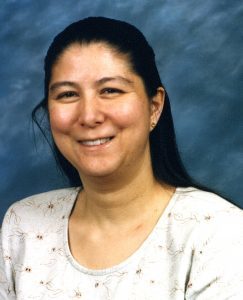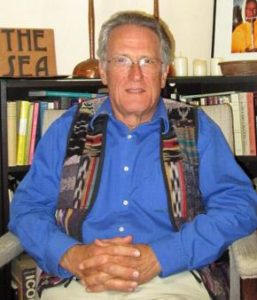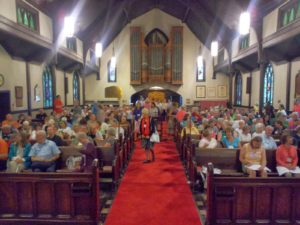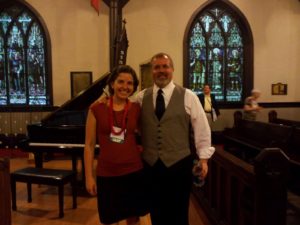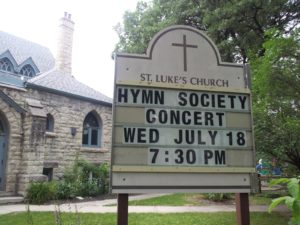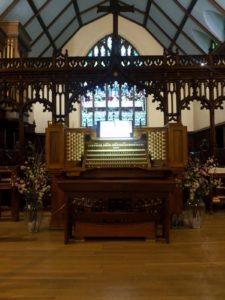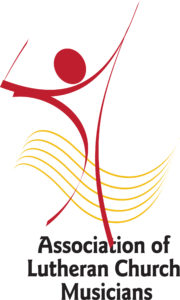Last Sunday at my little congregation in Baltimore, the pastor decided that for the passing of the peace we would encourage people to say “peace be with you,” bow, wave, jazz hands…anything but touch. We made it clear that this was not out of panic, but out of thoughtful precaution. Although not hugging and shaking everyone’s hand at this small family-like church felt very strange, I think it was the right decision. Meanwhile, I’ve heard from many of you, especially in places like Washington state, where church services are being altogether canceled or substituted for online/streaming options with only the worship leadership team meeting in the same room. So what is the role of congregational song in all of this? Can singing together help? Is singing together even possible when we aren’t physically in the same place?
With the absence of human touch, it is easy to feel disconnected and unloved. For those congregations that are still meeting but are taking steps like not touching during the passing of the peace, we need to step up our congregational song game. One simple but powerful way to increase our personal connections through song is to ask people to look at each other while singing. Choose a song they know well (particularly something cyclical that they don’t have to look at a page to see lots of words) and after a few repetitions invite them to sing to each other. Looking each other in the eye while singing can be an extremely personal and moving experience.
Singing at Home
For those who are moving to an online/streaming option where most of your congregation will be worshiping from home, singing together becomes very difficult. But this can be an opportunity to reestablish the tradition of family hymn-singing in the home. Singing hymns with the family at home is an old devotional tradition that has largely be lost in America today. What if we took this opportunity to reclaim that tradition? Here are a few guidelines and ideas that might help re-establish this powerful singing tradition:
- Tell people ahead of time that during the stream services they will be invited to sing with whoever they are with, whether it’s just themselves, their spouse and family, or their nursing home friends.
- Set expectations. Things like:
- We hope you will sing, even if you’re by yourself. While we can’t hear each other, God will hear our voices raising together.
- It won’t sound like it normally does when we’re all together and that’s okay!
- God commands us to sing unto the Lord and doesn’t mind if your voice is a little shaky or off-pitch. God delights in your voice because God gave it to you and only you.
- Singing is an ancient Christian tradition. No virus or any other global crisis can keep God’s people from raising our voices in praise. By singing from home, we are engaging in an act of resistance, telling the world that no matter it throws at us we will be faithful to the God who casts out fear.
- Have a hymnal or song-book team prepared to deliver books to your congregation. Let your people know that if they don’t have a hymnal at home or a song-book of some kind that they can contact the church office and someone will deliver it to their home. This is a great opportunity for your choir or praise team to serve. Also have a downloadable resource available if possible.
- Have the music or lyrics prepared on your live-stream platform. Remember that people will have less support than they normally do for the congregational singing parts of your service. Providing them with more resources (like notation) than normal is important to set them up for success.
- Choose songs that works well a cappella. This is where the great hymns of the past often excel. Simple melodies without big leaps, smaller melodic ranges, and less syncopation are all things that help make something more accessible to singers at home.
- Choose songs that people know well. This is not a good time to choose new songs or try to teach. There’s enough uncertainty going around. Give people something to hold on to that is familiar and comforting. This is a time to lean on whatever songs and hymns that your people know and know well.
- Finally, and this is important, have your leadership stop singing. Seriously. If a soloist is singing on the screen, people will be much more likely to just listen to it like a solo than to sing themselves. I challenge you to just play the accompaniment and not sing along, like a karaoke track. This will feel awkward to you in leadership. That’s ok…it’s not about you. It might work like this:
- Friends, we’re now going to sing “it is well with my soul.” I’ll sing the stanza 1, but then we invite you at home to sing the remaining stanzas at home.
- Sing stanza 1 with refrain.
- Play stanzas 2-4 and only sing on the refrain. Have the music or “stanza 2” or something like that displayed on the screen so that people know where they are. Include the melody strongly on an instrument like the organ, flute, or other obbligato instrument.
- Finally, follow-up with your people. Did they sing? What was their experience? How could it be improved. Make this a community effort to worship together while in diaspora. Let them know you’re there to support their song even when you’re not in the same room.
Singing for Others
There are times in our lives when we can’t do certain things. When we’re babies, our parents have to do pretty much everything for us. Until we get our driver’s license, we have to get driven around to our various events. When we’re young professionals we often need colleagues help to train us and teach us new procedures. When we’re older we often need help moving while downsizing, driving to doctor appointments, and so on. And then there are times when it is difficult to pray, such as when we’re grieving. The Apostle Paul reminds us that when we struggle to pray the Spirit prays for us. Likewise, when our congregation members find it difficult to sing, we can sing for them. This may be one of those times when your staff, worship team, and/or choir needs to step up their own singing game to sing for the congregation. While we must be careful that this doesn’t become a permanent replacement, it is good for us to take up the role of singing to the Lord on behalf of the congregation. This may be a time when more solos, choir anthems, and other “special music” is used instead of congregational song. Don’t apologize or lament this, name it. Take it up as a part of your mission for the church and handle it with respect, always ready to hand it back to the congregation when you are able to gather again.
Helpful Resources
Most popular hymns of all time as listed by hymnary.org
Hymns in Times of Crisis – Free Download
Live-Streaming Copyright Guidelines
Prayer & Action
Every year the world seems to be in a new crisis: war/conflict, stock market crash, terrorist attack, or a global virus. It is in these situations where people are fearful or panicked that the church must step in to say “be not afraid.” We must be the voice of reason and peace. We must be the ones to say that violence is not acceptable, money is not God, and panicking out of fear is deadly. God has given us tools for dealing with idols and fear…things like preaching the gospel, prayer, and song. So tell people about Jesus, pray for peace and wholeness for this world, and sing with people.
The church must also help spread truth, not fiction. God has given us other tools and knowledge on how to live through global pandemics…things like hand sanitizer, common-sense health precautions, and global health experts to advise us. Use hand sanitizer, don’t go out when you’re sick, and listen to those knowledgeable about science and healthcare. In a time of fear and anxiety, let’s set the example on how to fact-check and spread thoughtfulness.
CDC Updates on COVID-19 (Corona Virus)
Johns Hopkins Article on COVID-19 (Corona Virus)
If you have other helpful ideas, resources, or thoughts, please use the comment section below to share.
Author Brian Hehn is the Director of The Center for Congregational Song.



